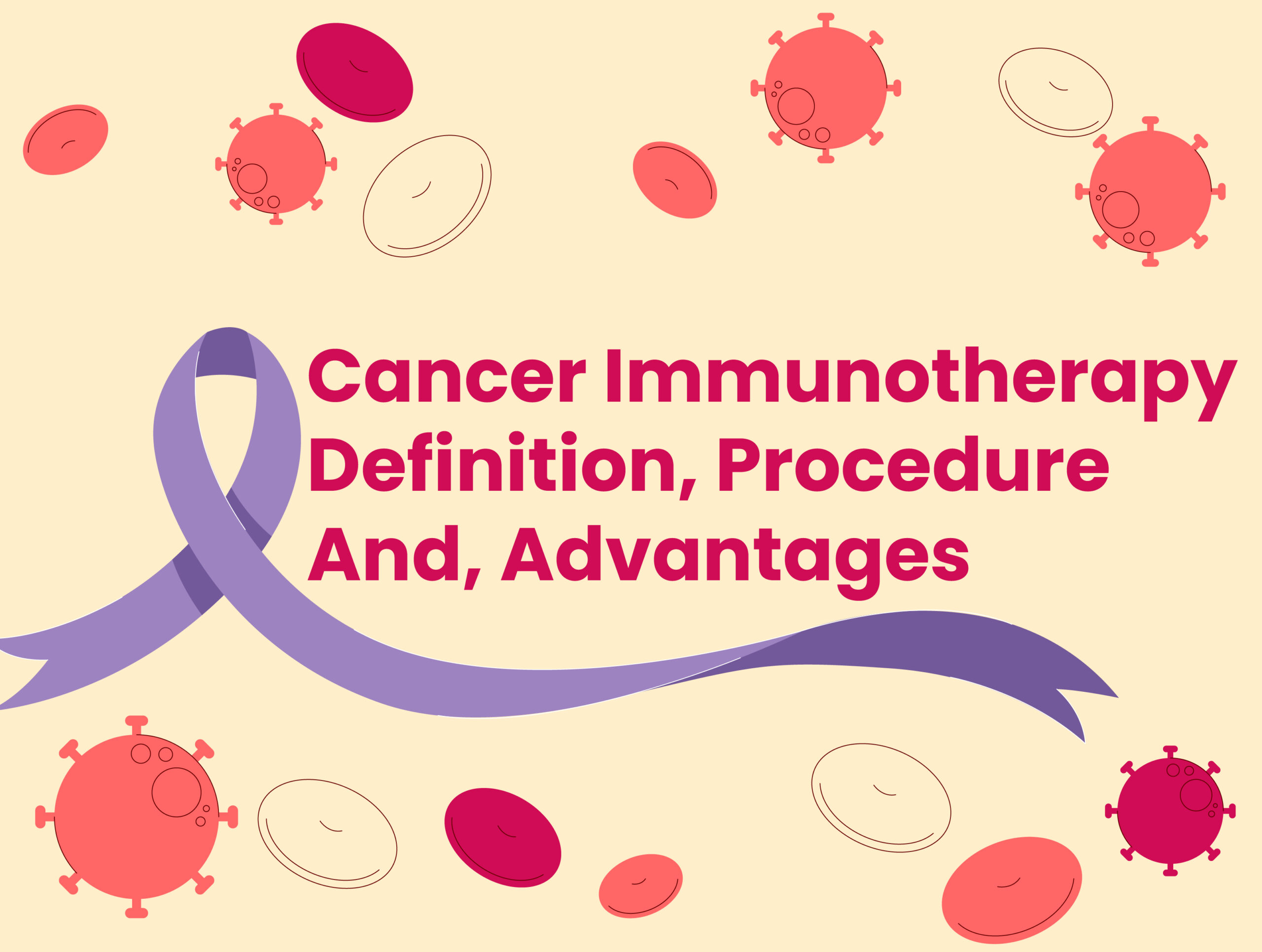Cancer immunotherapy is a cancer treatment method, but people are unaware of it. Therefore, cancer immunotherapy awareness month is celebrated in June 2023 to make people aware of cancer immunotherapy, its definition, procedure, and advantages.
The body’s immune system is used to fight cancer in this treatment method. There has been an increasing trend of using cancer immunotherapy for cancer treatment in recent years.
What Is Immunotherapy?
Immunotherapy generally refers to any treatment procedure where the body’s immune system is used to fight against the targeted disease.
Similarly, cancer immunotherapy is a treatment method in which the body’s immune system is used to identify and target the killing of cancer cells. The need for cancer immunotherapy arises because cancer cells can to evade the immune system.
What Is Immunotherapy Treatment?
The general idea behind the immunotherapy treatment procedure is to boost the body’s immune system or help the body’s immune system identify, target, attack, and kill cancer cells. Therefore, medications provide a boost or help in most immunotherapy treatment procedures.
Immune cells like T-cells are drug targets whenever treatment involves boosting the immune system. Whenever the procedure is about making the cancer cells recognizable to the body’s immune system, the drug targets are the cancer cells.
What Does Immunotherapy Do For Cancer?
Immunotherapy is one of the best solutions to cancer treatment as it is dependent on the body’s immune system. Triggering the body’s immune system of the body for cancer treatment helps in:
Killing cancer cells directly
Helping the immune system to recognize and attack cancer cells.
Preventing cancer cells from spreading.
What Is Cancer Immunotherapy?
Cancer immunotherapy depends on the immune system of the body. The therapy utilizes the immune system for recognition and attacking the cancer cells. Generally, cancer cells have developed ways of evading the immune system. But by using the immunotherapy technique, the treatment can be used to overcome the defenses of the cancer cells.
Immunotherapy is classified into two different types. The two types so cancer immunotherapy are:
- Checkpoint Inhibitor Drugs: The drugs used in this therapy work by blocking specific proteins in the cancer cells, which help them to escape the immune system. Once these proteins are destroyed, the immune system can identify the cancer cells and attack them.
- T Cell Therapies: In this therapy, the specific immune cells known as T-cells are used. The patient’s T-cells are taken from the body and are engineered in a way that they can recognize and attack the cancer cells.
Is Cancer Immunotherapy Effective?
Yes, cancer immunotherapy has proven itself to be a very effective method of treatment in many different types of cancer cases like melanoma (skin cancer), lung cancer, kidney cancer, and head and neck cancer.
Under certain scenarios, immunotherapy has been found to be much more effective and also efficient when it is compared to the traditional forms of cancer treatment like chemotherapy and radiation therapy.
What Types Of Cancer Can Be Treated With Immunotherapy?
We know that cancer immunotherapy treatment works. We know how it works. Now let us understand what types of cancers it work.
Cancer immunotherapy is currently approved for the treatment of cancers such as:
Melanoma (Skin Cancer)
Lung cancer
Kidney cancer
Head and neck cancer
Bladder cancer
Colorectal cancer
Non-Hodgkin lymphoma
Multiple myeloma
Scientists are actively involved in researching the possible applications of cancer immunotherapy treatment for various other kinds of cancers apart from the one mentioned above.
What Drugs Are Used In Immunotherapy?
A number of different medicines have been developed for immunotherapeutic treatment of cancer. The classification of the drugs used for immunotherapy is as follows:
Checkpoint inhibitors
T-cell therapies
Monoclonal antibodies
Cytokines
What kind of drugs will be used in immunotherapy will depend on the type of cancer being treated and the patient’s individual physical conditions.
Cancer Immunotherapy Examples
Scientific application for cancer immunotherapy has increased with the number of drugs available. For example, nivolumab is a checkpoint inhibitor. It is used for many different cancer treatments, like skin cancer, lung cancer, kidney cancer, and head and neck cancer.
Another cancer drug called Pembrolizumab is also a checkpoint inhibitor that has been approved and used for the same cancers as mentioned above. Atezolizumab, too, is from the same class of drugs and works by inhibiting checkpoint proteins. It is used for the treatment of lung cancer, bladder cancer, and kidney cancer.
A T-cell-based therapy drug known as T-VEC has been approved and is used for the treatment of skin cancer.
What Cancers Does Keytruda Treat?
Keytruda is a specific anti-cancer drug used in cancer immunotherapy treatment. It belongs to the class of checkpoint inhibitors of drugs responsible for targeting proteins within cancer cells which help them evade the immune system.
Keytruda is generally approved and used for the treatment of the following kinds of cancers:
- Melanoma
- Lung Cancer
- Kidney Cancer
- Head and Neck Cancer
- Bladder Cancer
Conclusion
Cancer immunotherapy is a new technique in the field of cancer treatment. Although in nascent-stage cancer, immunotherapy has shown great potential for cancer treatment in recent years. It will play an important role in the field of cancer treatment.
But before undergoing any cancer treatment therapy, it is very important to consult your doctor about the risks and benefits of the treatment and the impact the procedure will have on your body. Cancer immunotherapy may or may not be applicable to everyone, and the effect of the treatment can vary from person to person.
Therefore, being cautious and consulting the experts before undergoing cancer treatment is essential. Vydehi Cancer Center houses expert oncologists providing a wide array of cancer treatments like radiation therapy, chemotherapy, cancer surgery, etc. VCC also believes in providing affordable cancer treatment and believes in providing complete possible treatment, including a second opinion as well.

